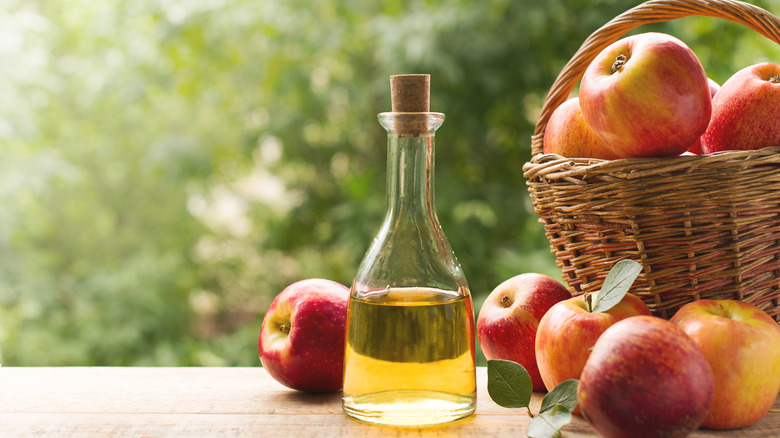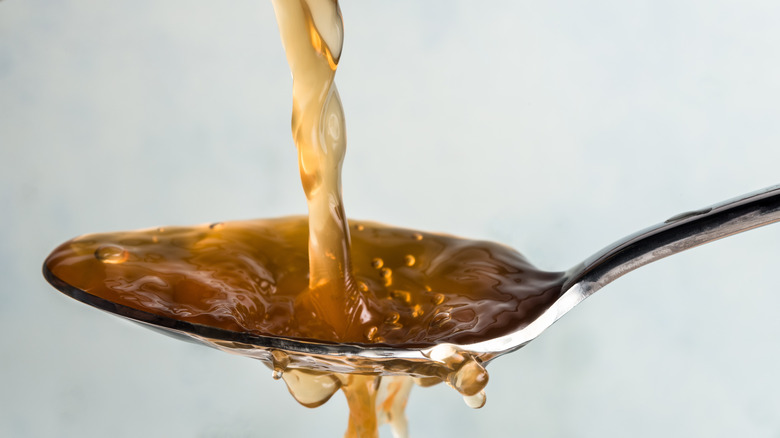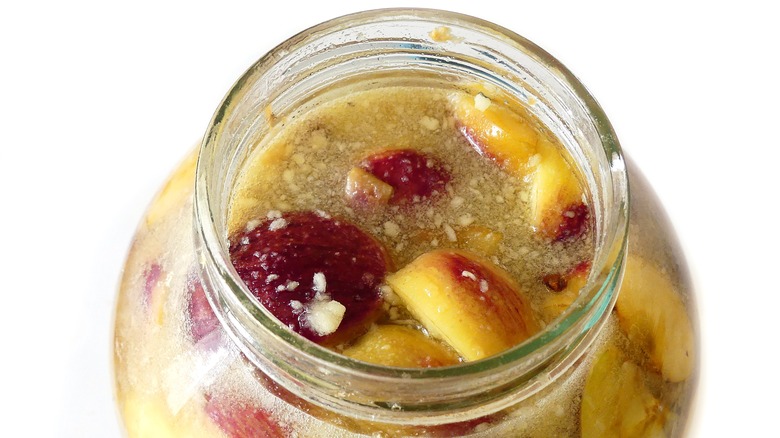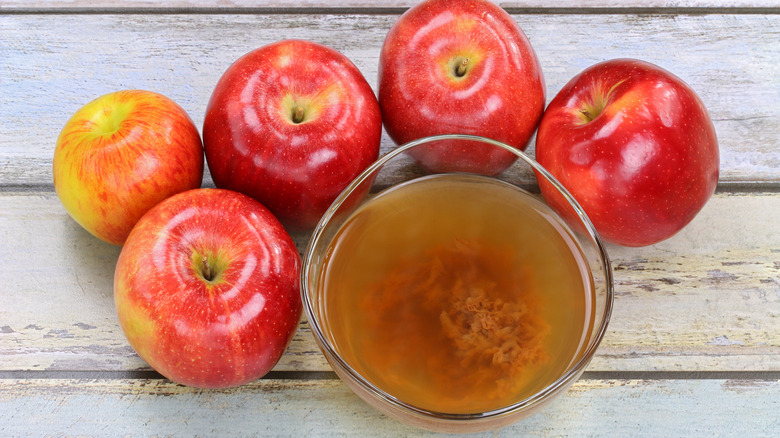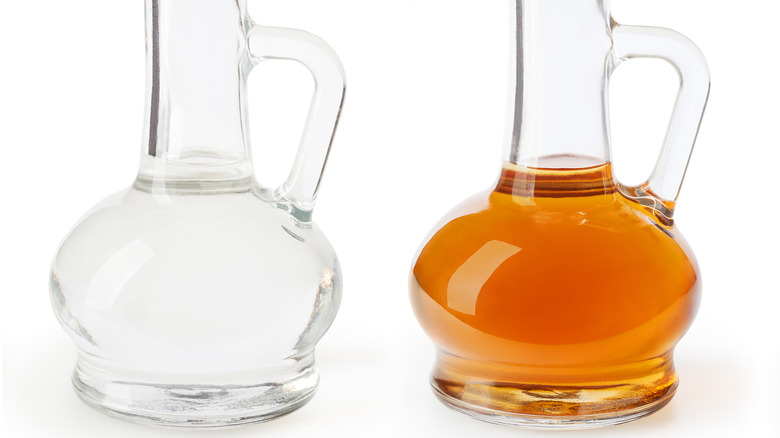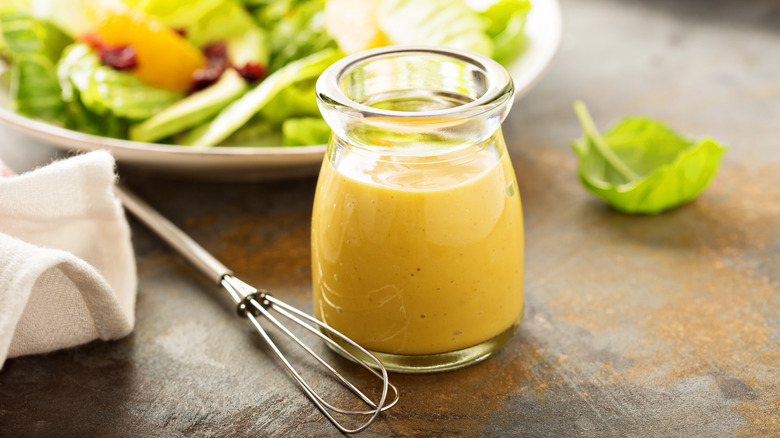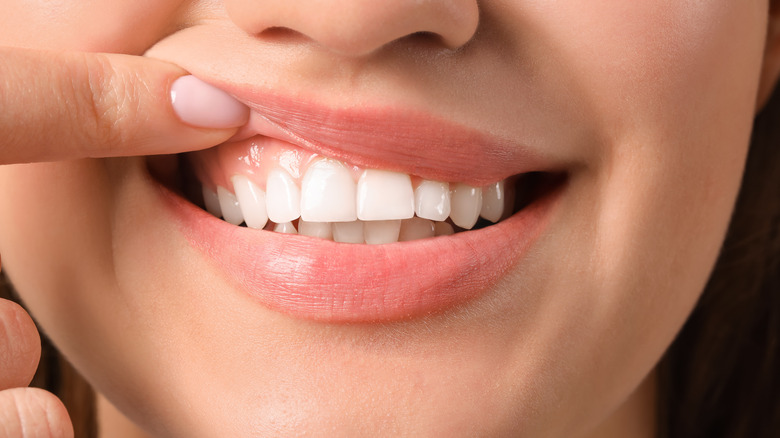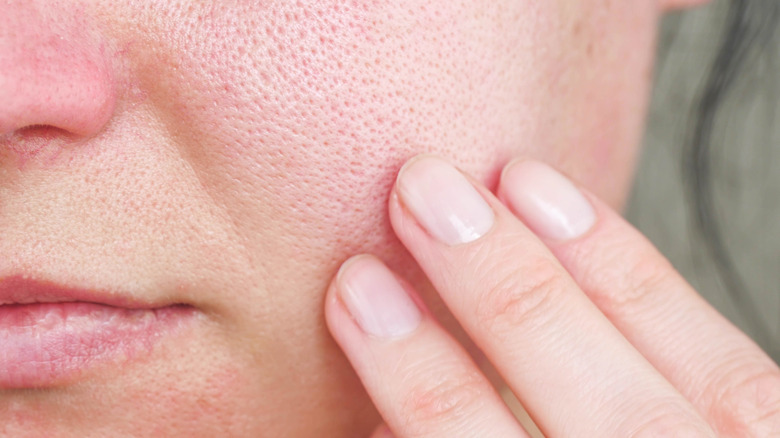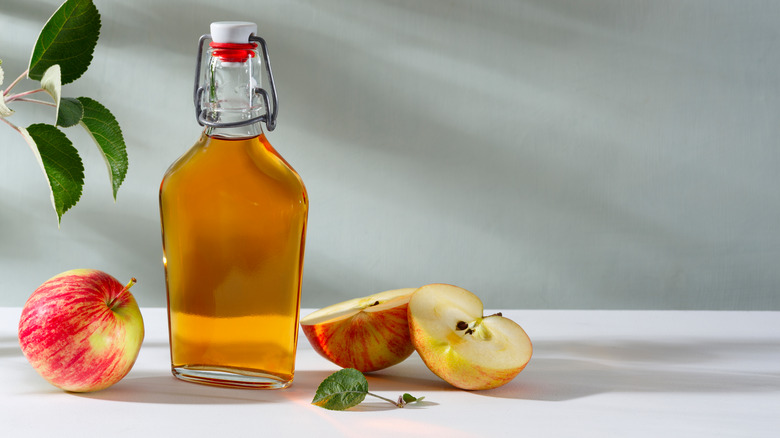11 Facts You Should Master About Apple Cider Vinegar
Apple cider vinegar, friend or foe? Super elixir or overhyped home remedy? The apple-based vinegar has been steadily climbing up the popularity ladder in the past few years. It has been built up and knocked down so many times that you may be feeling confused about the actual facts of the now-common household item. Given its ubiquity, it's worth clearing up some of the misconceptions surrounding it, assessing how it compares to other kinds of vinegar, examining its health benefits, and seeing how it can be used around your kitchen and home.
Apple cider vinegar may seem like a relatively new product but it has a long history that spans hundreds of years across many cultures worldwide. According to Freedom of Heath, as far back as 1200 BC, different versions of vinegar have been used throughout the medical and health fields, either mixed with honey or spices as a drink or used to sterilize hands and other surfaces. Certain cultures used to drink vinegar to maintain overall health, and others used it to treat conditions such as coughs, detoxification, and to fight infections. The exact beginnings of apple cider vinegar are difficult to pinpoint, but history has shown us that it has many healing properties that have attracted attention throughout the years.
1. What is apple cider vinegar
Apple cider vinegar is twice fermented apple juice. Several different foods have naturally occurring ingredients needed to make vinegar, it's not just apples. According to Bragg, apples must undergo a layered process that takes time and patience before they become vinegar. The fruit is churned and pressed into a juice that includes the skin and cores, then the juice is fermented twice.
First, the natural sugars and yeast transform the juice into alcohol, which is exactly how other alcoholic drinks are made. As more time passes, another phase of fermentation occurs and the liquid becomes extremely acidic, resulting in vinegar. The bacteria and enzymes that transform ethanol (alcohol) into acidic vinegar are known as the mother in apple cider vinegar. This is considered good bacteria and is largely why the liquid has so many health benefits.
According to the Harvard School of Health, making vinegar can take several weeks or months, whether you're using fruits or grains. This process, which mainly involves letting apple juice sit for a period of time, was discovered after wine sat in storage for too long. In fact, vinegar is simply very sour wine. Since apples already contain sugar, yeast, and bacteria, the result is a natural marvel.
2. Making apple cider vinegar at home
Apple cider vinegar can be quite costly at the store. Its growing popularity, inflation, and the desire for organic and natural products have caused the price of your favorite home remedy to spike. The good news is that vinegar is quite simple to make in your own kitchen. You'll only need a few common household items and some patience. Plus, it doubles as a great way to minimize waste and use up your food scraps.
MasterClass lists a large glass jar, rubber band, cheesecloth or light towel, apple scraps, sugar, and water as the items necessary to make apple cider vinegar. After adding the apples, sugar, and water to a jar, simply cover it and leave it somewhere cool and dark to sit. Allow the mixture to soak for a few weeks before removing the apple scraps. Then, just let the second fermentation process take place by itself. Temperatures that are too warm could cause mold to grow, so keep an eye out and be sure to place your jar in a cool area out of direct light.
3. Differences between filtered and unfiltered apple cider vinegar
The most important factor that differentiates filtered versus unfiltered apple cider vinegar is the mother. This murky, sometimes thick substance is made up of good gut bacteria and enzymes, according to Herbals the Essence of Herbs. This bacteria occurs naturally and is crucial in the juice-to-vinegar process. It is said to contain many of the health benefits of apple cider vinegar, but it is often eliminated by straining, filtering, or pasteurizing to produce a clear smooth liquid.
The mother is not harmful and can be consumed or used to create more apple cider vinegar. However, some people do not like the appearance or texture of the mother especially when cooking. Check the label or look at the clarity of the vinegar to determine what you have. A cloudy appearance is usually a good indicator that your apple cider vinegar is unfiltered, raw, and typically organic.
As far as cooking with filtered versus unfiltered vinegar, it's more about personal preference. Some may argue that the apple taste is stronger in unfiltered versions because of the presence of the mother, but the difference is minimal. The texture won't significantly impact the result if you are baking, cooking, or heating the product. However, if you are using the vinegar in a cool drink, marinade, salad dressing, or in another cold recipe, the thicker texture will be more prominent.
4. Differences between apple cider vinegar and white vinegar
Apple cider vinegar is made when apple juice becomes alcoholic and then transforms into vinegar. According to MasterClass, white vinegar — the most commonly known and used form of vinegar — undergoes a similar process involving grains, such as corn or wheat. This results in clear vinegar with a higher acidity than apple cider vinegar, which is best diluted with water.
These two kinds of vinegar have several comparable properties, and when it comes to cooking they are often used in similar ways. However, depending on the recipe there are a few differences to consider. In terms of appearance, white vinegar is clear and apple cider vinegar has a more golden, coppery look to it. In addition, apple cider vinegar is often used in marinades and salad dressings for the subtle hints of apple flavor that are enhanced in its raw form. In baked goods and sauces, the flavors are not as noticeable; therefore, the two can be exchanged for one or the other. Finally, when it comes to pickling, the higher percentage of acid in white vinegar works better.
5. Cooking with apple cider vinegar
Apple cider vinegar can be used for many purposes around the house, from remedies to cleaning. In the kitchen, it easily provides a tart, crisp flavor to dishes. Vinaigrettes, salad dressings, and marinades are the most common sauces that call for apple cider vinegar because they contain powerful flavors that infuse into meats and other foods. Dressings and marinades with apple cider vinegar are an excellent way to get creative in the kitchen without overwhelming beginner palates. Pairing vinegar with mustard, which is already naturally tart, or mixing it with salty, fatty bacon can create complementary flavors that work seamlessly together.
Plenty of recipes contain vinegar in surprising ways. For example, barbecue sauce is often made by mixing ketchup, seasonings, and vinegar. Pulled pork and french fries are often served with a splash of vinegar, and apple cider vinegar can be used the same way. Pickling red onions, cabbage, cucumbers, peppers, and other vegetables are yet another way to utilize apple cider vinegar around the kitchen. The refreshing taste packs a punch that is unforgettable.
6. ACV may lower blood sugar and cholesterol
This versatile liquid has been touted as a powerful tonic with a plethora of health benefits that go beyond simple home remedies. According to For Care Education and Research, vinegar can even aid in lowering blood sugar and cholesterol. Although apple cider vinegar has a long history used for bettering health, there are more and more scientific studies each year that narrow in on the details.
Meanwhile, Proactive Health Labs notes that the various forms of acid in vinegar can have similar effects to certain diabetes medications. When consumed immediately before or after eating, it helps level out insulin and handles extra glucose in the body after a meal. Apple cider vinegar has also been reported to aid digestion, which can in turn positively impact blood sugar levels.
High cholesterol and diabetes are two leading health issues in the United States, and they can both be treated with apple cider vinegar. According to the International Journal of Medical Research & Health Sciences, studies examining apple cider vinegar have been conducted on animals and humans, and it has been shown to lower total cholesterol concentration, especially in diabetic subjects.
7. ACV may help with weight loss
Weight loss tricks, tips, and hacks to make it happen fast have always garnered a lot of attention. But now, healthier more natural options are favored, which is part of the reason why apple cider vinegar has become so popular over the years. According to For Care Education and Research, whether you drink it or take it as a supplement, it can be a helpful tool to use for weight loss. It certainly isn't a miracle drink and it must be paired with other changes to your diet to be successful, but the naturally occurring acids in vinegar can indeed promote weight loss. They appear to jumpstart your body into burning fat and calories, and in turn, could break down fat that accumulates in the body.
The acid in vinegar is also known for containing good gut bacteria that form during the two-step fermentation of the apple juice. In turn, this bacteria can promote a healthier gut, which in turn results in better digestion, satiation, and the ability to fight off bad bacteria. Ultimately, this can help create a better relationship with food.
According to WebMD, apple cider vinegar is best taken twice per day if weight loss is the goal. Consuming two tablespoons a day around meal times has shown some results. In addition, the high acidity can cause throat or stomach irritation, so consuming it with food is advised.
8. Tooth decay and other cons
When mastering a new home remedy or ingredient, it's important to recognize the risks and possible downsides. After all, it's uncommon to find a perfect product that doesn't involve a few hiccups. The main concern about apple cider vinegar is that the pH level can affect your teeth and mouth, according to Pittsford Dental Excellence Center. To compare, its pH level is approximately three, whereas drinking water is seven. Acetic acid can cause irritation and redness around your gums and it can chip away at the enamel on your teeth if used consistently and not diluted.
Enamel is part of the hard exterior of a tooth, and when it wears down it can lead to cavities and make your teeth more sensitive to hot, cold, and sweet foods. The acid in apple cider vinegar is mainly harmful if it's not diluted with water or taken too frequently. If you are experiencing sensitivity in your mouth, a safer option is to have it as a supplement in pill form. According to Harvard Health Publishing, another downside to consider is that it can disrupt your potassium levels. Extensive research on the effects of apple cider vinegar has not yet been completed. As of now, there aren't many long-term studies to reference and the exact outcomes of frequent use are unknown.
9. Apple cider vinegar could irritate your skin
Hair, nails, and skin have all been reported to benefit from apple cider vinegar. Although there are a ton of DIY recipes, tips, and tricks involving beauty at-home treatments, they are not always accurate and should be carefully researched before you attempt them.
According to Dermatology Times, apple cider vinegar became a popular treatment idea for skin conditions such as eczema and dermatitis. However, studies soon proved that even diluted apple cider vinegar could irritate skin and especially skin conditions. Although some sources report that vinegar can balance the pH in your skin, studies showed that the changes were long-lasting and could lead to irritation down the line.
According to Byrdie, apple cider vinegar is believed to help brighten and even out skin tones, remove dead skin, and clear out unwanted bacteria that could cause acne. However, there is a delicate balance that must be achieved. DIY tricks that suggest dabbing or even slathering undiluted vinegar on your skin will almost certainly result in a red irritated area that is similar to a chemical burn.
It's recommended to choose products that utilize small amounts of apple cider vinegar and have been carefully blended, mixed, and tested to see the effects on skin. As with any product, you should consider testing it on a small area of skin to see how you react. Allow at least a few hours to pass and observe the skin before moving forward.
10. ACV is not just for eating
If you're sold on the benefits of this natural home remedy, there are a few things you should know before pouring yourself a glass of apple cider vinegar. According to Express, even drinking diluted apple cider vinegar can be harmful to your teeth, cause bloating, and leave an unpleasant nauseous feeling in your gut. If you have a sensitive stomach, a supplement may be the best route to take.
One to two tablespoons of apple cider vinegar once or twice per day is the suggested dose, whether you're hoping to curb your appetite, boost your metabolism, or fight an infection. Consuming your dose around mealtime can offset some of the discomforts that may occur. You can dilute the vinegar in a large glass of water, mix it into your tea or juice, or add ingredients such as cinnamon, ginger, or lemon to make the taste more agreeable.
If you're not sold on drinking or eating the elixir, it can be used in several other ways. According to Down to Earth, spraying a little vinegar in your hair can cut through buildup or dandruff and work wonders on your scalp. Around the house, you can use it as a mild cleaner to remove stains or sticky residues as well.
11. Other uses for apple cider vinegar
The list of uses for apple cider vinegar seems to go on and on. What's better than a multipurpose home product that can be used all over the house? According to West Virginia University Extension, apple cider vinegar is antibacterial, which means it can ward off bad smells and give your space a fresh feeling. Add a few tablespoons of vinegar to a spray bottle filled with water and use it all over the house. Mist it in areas that are prone to bad smells such as around the trash can or even inside your smelly shoes. You can also use the spray on your pets to deter fleas and ticks.
Other uses are less common but equally helpful. For example, consider using the elixir to rid your house of pestilent fruit flies. Adding a few drops of soap to a cup or bowl of apple cider vinegar will attract and trap a number of annoying pests. The possibilities are endless when it comes to apple cider vinegar. Test these tricks out in your kitchen and around your home and soon enough you'll be an apple cider vinegar master with a whole array of tricks that are sure to come in handy.
